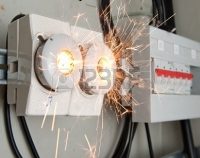2017 NEC Significant Code Changes Part 4: 4 PDH
$24.00
SPECIFIC KNOWLEDGE OR SKILL OBTAINED
This course teaches the following specific knowledge and skills:
- Become familiar with some of the significant changes including additions, deletions, and modification to the 2017 Edition of NFPA 70: National Electrical Code (NEC) from the 2014 Edition for Chapters 6
- Comprehend, after reviewing the significant changes and additions to the 2017 Edition of NFPA 70: National Electrical Code (NEC) the large scope of the changes to the code, thereby seeking additional and more thorough reviews of the entire code
CERTIFICATE OF COMPLETION
You will be able to immediately print a certificate of completion after passing a 20 question multiple-choice quiz. The quiz can be retaken unlimited times until a passing grade of 70% or better is earned. This course satisfies four (4) professional development hours (PDH) of continuing education.
Related Courses
AC Motors, Transformers, Instruments & Distribution Systems: 6 PDH
$36.00 Add to cartThis course provides an excellent overview of 1) AC motor theory, applications, and industrial usage, 2) Transformers and transformer design, 3) Instruments and measuring devices, and 4) distribution systems.Instructor: Juan Pesante, PEThis course provides an excellent overview of 1) AC motor theory, applications, and industrial usage, 2) Transformers and transformer design, 3) Instruments and measuring devices, and 4) distribution systems.
SPECIFIC KNOWLEDGE OR SKILL OBTAINED
This course teaches the following specific knowledge and skills:
- AC motor theory
- AC motor construction and operation
- AC motor applications and usage
- Transformer theory and design
- Electronic Measuring devices
- Instrument construction
- Distribution systems
CERTIFICATE OF COMPLETION
You will be able to immediately print a certificate of completion after passing a 20 question multiple-choice quiz. The quiz can be retaken unlimited times until a passing grade of 70% or better is earned. This course satisfies 6 professional development hours (PDH) of continuing education.
Preview CourseClick “Preview Course” to View Prior to PurchaseClick “Add to Cart” to Purchase and Access QuizIntroduction to Electrical Power Requirements for Buildings: 2 PDH
$12.00 Add to cartThis online course is an introduction to electric power requirements for building and multi-building developments. In this course you will learn about terminology, acquistition and analysis of preliminary load data needed, estimate individual loads, emergency loads, area loads and loads for entire developments and activities. This course will teach you about basic considerations for power sources and considerations when purchasing primary electric power from a utility. This course will give electrical engineers who have limited experience with building design an introduction to electric load estimating methodology.Instructor: Juan Pesante, PEThis online course is an introduction to electric power requirements for building and multi-building developments. In this course you will learn about terminology, acquistition and analysis of preliminary load data needed, estimate individual loads, emergency loads, area loads and loads for entire developments and activities. This course will teach you about basic considerations for power sources and considerations when purchasing primary electric power from a utility. This course will give electrical engineers who have limited experience with building design an introduction to electric load estimating methodology./p>
SPECIFIC KNOWLEDGE OR SKILL OBTAINED
This course teaches the following specific knowledge and skills:
- Know how to convert motor horsepower to input kilovolt-amperes for preliminary estimates
- Define Demand Factor and know how it is used to determine power requirements
- Define Diversity Factor and know how it is used to determine power requirements
- Define Coincidence Factor and know how it is used to determine power requirements
- Learn the guidelines for selection of Demand Factors
- Learn the guidelines for selection of Load Factors
- Know the three types of emergency power loads
- Demand and Load Factors for a wide variety of buildings and activities
- Estimate lighting power requirements for various areas
CERTIFICATE OF COMPLETION
You will be able to immediately print a certificate of completion after passing a 15 question multiple-choice quiz. The quiz can be retaken unlimited times until a passing grade of 70% or better is earned. This course satisfies 2 professional development hours (PDH) of continuing education.
Preview CourseClick “Preview Course” to View Prior to PurchaseClick “Add to Cart” to Purchase and Access Quiz




